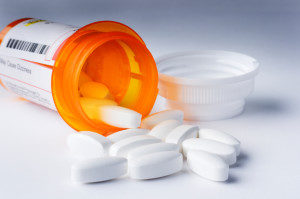Driving under the Influence (DUI) of Prescription Drugs – Oxycontin
Parsippany Driving under Influence of Prescription Drugs
DUI Lawyers handling cases in Parsippany, New Jersey

DUI Oxycontin Charges Morris County NJ
In New Jersey it is illegal to drive under the influence of drugs. OxyContin, for example, is a prescription drug classified as a narcotic which can severely inhibit your ability to operate a motor vehicle. In State v DiCarlo, 67 N.J. 321, the Supreme Court ruled that the operator of a motor vehicle was under the influence of a narcotic drug if the substance produced an effect that would alter his or her normal physical coordination and mental faculties.
Our DUI defense team has handled hundreds of DUI cases dealing with drugs. In fact, one of our team members used to prosecute DUI cases for the State of NJ, now he uses his experience and expertise to represent our clients facing similar offenses. In addition, another attorney at the firm is a certified field sobriety test instructor so he can analyze the psycho-physical tests and determine if they were conducted properly, demonstrated properly, and graded properly according to the national standards. Finally, we also have a retired drug recognition expert (DRE) police officer who we utilize as a defense expert in DUI cases. He will examine the State’s DRE expert report and combat the findings to help fight your charges in court. Our Morris County NJ DUI defense lawyers represent clients in Parsippany, Morristown, Denville, Dover, Mount Olive, Madison, and Jefferson Twp. For more information, contact our DUI defense team now for a free initial consultation at 908-336-5008.
How Does Oxycontin Effect My Ability to Drive
It is no secret that New Jersey and the United States is fighting major addiction issues relating to prescription drugs. OxyContin is the number one most abused prescription drug in America. It is a pain reliever that gives a euphoric and sedative effect. OxyContin acts on the same receptors as natural endorphins. This stops pain signals from being sent to the brain which means if pain remains the person will not feel as much of it. Side effects to OxyContin such as sleepiness, blurred vision, and dizziness occur then a person should not operate a motor vehicle. The defined phrase “under the influence” means a substantial deterioration of mental faculties or physical coordination of a person due to intoxicating liquors, narcotic, hallucinogenic, or habit producing drugs. With that statement in mind since OxyContin can have a sedative effect it would be considered “under the influence”. It is also advised by the drug manufacturers of Oxycontin to not operate motor vehicles while under the influence of this substance.
Here is some helpful information on Oxycontin and Prescription Drugs:
https://newlifehouse.com/top-10-commonly-abused-prescription-medications/
How to Fight an Oxycontin DUI Charge in New Jersey
In State v. DiCarlo, 67 N.J. 321, (1975), the Court considered a driver who was under the influence of Methadone, a prescription drug similar to Oxycontin. The Supreme Court determined that the person operating the motor vehicle was under the influence of a drug (oxycontin) if it produced and altering effect on physical and mental abilities. In order to prove a person is under the influence of Oxycontin expert testimony is needed in court. This expert is called a Drug Recognitions Expert (DRE) who conducts tests to determine if a person is under the influence of narcotics, hallucinogenic, or habit producing drugs. In order to prove a defendant was under the influence the State must present evidence from the qualified expert. This is done with the field tests that were conducted in addition to psychological tests. In most cases, a urine sample is taken from the driver and sent to the lab for testing. However, the urine alone does not prove that the driver was under the influence at the time of operating the motor vehicle since many drugs stay in your system for a long time after taking them. As a result, the State must use a DRE to conduct testing and give an expert opinion as to whether or not the person was under the influence at the time of operating the motor vehicle.
In New Jersey, driving under the influence of drugs (DUI) is regulated by N.J.S.A. 39:4-50 which is the same statute that governs driving while intoxicated (DWI). If you are charged with DUI or DWI, you are facing the same penalties as a first, second, third or subsequent offender.
Those penalties are as follows:
- First offense – Driver’s license suspension of 7 months – 1 year; Up to 30 days in jail
- Second offense – Driver’s license suspension of 2 years’ 2-90 days in jail
- Third or subsequent offense – Driver’s license suspension of 10 years; Mandatory 180 days in jail (90 can be served at inpatient rehab facility)
Charged with Driving Under Influence of Oxy in Morris County? We Can Help
For more information about Prescription Drug DUI charges in NJ, contact our offices now for a free initial consultation at 908-336-5008.

